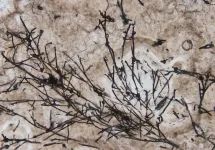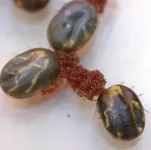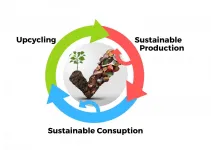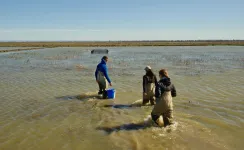Discovery of early plasma biomarkers for Alzheimer's disease
A research team at INRS has discovered two early plasma markers to detect Alzheimer's disease five years before its onset.
2021-01-28
(Press-News.org) A Quebec research team has discovered two early plasma markers to detect Alzheimer's disease five years before its onset. The results of this recent study led by the doctoral student Mohamed Raâfet Ben Khedher and postdoctoral student Mohamed Haddad, directed by Professor Charles Ramassamy of the Institut national de la recherche scientifique (INRS), have been published in the prestigious scientific journal Alzheimer's & Dementia: Translational Research & Clinical Interventions (TRCI).
The diagnosis of Alzheimer's disease is usually based on a series of psychometric tests assessing cognitive function, brain imaging and cerebrospinal fluid analysis. Yet, these tests have their limitations. "The lumbar puncture is invasive, while brain imaging is expensive and not 100% reliable. This complicates regular follow-up," says Professor Ramassamy.
Moreover, people with the disease are often being diagnosed at a late stage of the disease. "We need to find more and more early markers so we can act as soon as possible. When the disease is symptomatic, there is little, if any, way back," he explains.
The research team took up this challenge by discovering two markers, detectable through a blood test, enabling them to follow the progression of the disease. These markers are found in plasma extracellular vesicles, pockets that are released by all cells in the body and circulate in the bloodstream.
The variation of markers
The team focused specifically on the "sporadic" Alzheimer's disease, the most common type of the disease. It stems mainly from the presence of the APOE4 susceptibility gene, the E4 variant of the gene coding for apolipoprotein. Patients with this gene who developed the disease five years later had markers present that varied with the progression of the disease.
The research was carried out by analyzing blood samples collected as part of the Canadian Study of Health and Aging (CSHA). The population studied consisted of patients with cognitive problems, but not suffering from dementia, and only some of whom developed Alzheimer's disease. Professor Ramassamy hopes to analyze a larger population with pre- and post-disease samples. This would allow him to determine the progression of markers after the onset of symptoms. His research on the markers located in the vesicles, opens up the possibility for studying other diseases, such as vascular dementia.
INFORMATION:
About the study
The article "Apolipoprotein E4-driven effects on inflammatory and neurotrophic factors
in peripheral extracellular vesicles from cognitively impaired not demented participants converted to Alzheimer's disease" follows a study published in February 2020. The research was supported by a donation from the Charron family through the Armand-Frappier Foundation, as part of the Louise and André Charron Research Chair in Alzheimer's Disease, enabling the acquisition of a crucial piece of equipment, the NanoSight NS300.
About INRS
INRS is a university dedicated exclusively to graduate level research and training. Since its creation in 1969, INRS has played an active role in Quebec's economic, social, and cultural development and is ranked first for research intensity in Quebec and in Canada. INRS is made up of four interdisciplinary research and training centres in Quebec City, Montreal, Laval, and Varennes, with expertise in strategic sectors: Eau Terre Environnement, Énergie Matériaux Télécommunications, Urbanisation Culture Société, and Armand-Frappier Santé Biotechnologie. The INRS community includes more than 1,400 students, postdoctoral fellows, faculty members, and staff.
Source :
Audrey-Maude Vézina
Service des communications de l'INRS
418 254-2156
audrey-maude.vezina@inrs.ca
[Attachments] See images for this press release:
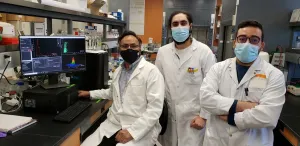
ELSE PRESS RELEASES FROM THIS DATE:
2021-01-28
Support for policies prohibiting smoking and the use of tobacco products on Oregon State University's Corvallis campus grew substantially over a five-year span, especially among tobacco users, a recent OSU study found.
The study, published earlier this month in the journal Preventive Medicine, is unique in its analysis of support for smoke- and tobacco-free campus policies over a long period of time. Most other studies of attitudes toward smoking policies only assess a single point in time.
"Tobacco-free policies are one of the most effective things we can do to reduce the burden of tobacco use, and they are highly supported ...
2021-01-28
Navigating, exploring and thinking about space are part of daily life, whether it's carving a path through a crowd, hiking a backcountry trail or maneuvering into a parking spot.
For most of human history, the driving force for day-to-day wayfinding and movement across the landscape was a need for food. And unlike other primates, our species has consistently divided this labor along gender lines.
In new research published in Nature Human Behaviour, scientists including James Holland Jones of Stanford and lead author Brian Wood of University of California, Los Angeles, argue that the increasingly gendered division of labor in human societies during the past 2.5 million years dramatically shaped how our species uses space, and possibly ...
2021-01-28
A research team from HSE University and SkolTech, together with experts from the Smorodintsev Research Institute of Influenza in St. Petersburg and the RAS Kharkevich Institute for Information Transmission Problems (IITP), discovered that the SARS-CoV-2 virus independently entered Russia at least 67 times, mostly at the end of February and beginning of March 2020. The vast majority of introductions came from European countries. No cases of introduction from China were registered, which is likely due to the timely closure of borders with the country. Currently, nine local virus lineages are circulating in Russia, which are not present elsewhere in the world. Given that Russia was actively 'importing' the virus from abroad, the researchers have not detected any cases of 'exporting' ...
2021-01-28
ROCHESTER, Minn. -- In a new study published in Circulation, Mayo Clinic researchers provide the first preclinical, proof-of-concept study for hybrid gene therapy in long QT syndrome, a potentially lethal heart rhythm condition.
Researchers demonstrated its potential therapeutic efficacy in two in vitro model systems using beating heart cells reengineered from the blood samples of patients with 1 long QT syndrome. They targeted the whole KCNQ1 gene rather than specific LQT1-causative mutations, making this study applicable to all patients with long QT ...
2021-01-28
When you think of fungi, what comes to mind may be a crucial ingredient in a recipe or their amazing ability to break down dead organic matter into vital nutrients. But new research by Shuhai Xiao, a professor of geosciences with the Virginia Tech College of Science, and Tian Gan, a visiting Ph.D. student in the Xiao lab, highlights yet another important role that fungi have played throughout the Earth's history: helping the planet recover from an ice age.
A team of scientists from Virginia Tech, the Chinese Academy of Sciences, Guizhou Education University, and University of Cincinnati has discovered the remains of a fungi-like microfossil that ...
2021-01-28
A tick saliva study reveals immune responses that could lead to better protection for cattle.
Scientists from Hokkaido University, Japan and Universidade Federal do Rio Grande do Sul and Universidade Federal do Rio de Janeiro, Brazil, have revealed that substances in tick saliva activates immune response-suppressing proteins in cattle that facilitates the transmission of tick-borne diseases. The finding was published in the journal Scientific Reports and could help in the development of alternative control strategies.
The Asian blue tick, Rhipicephalus microplus, feeds on cattle, causing skin lesions, ...
2021-01-28
There's a better end for used food than taking up space in landfills and contributing to global warming.
UC Riverside scientists have discovered fermented food waste can boost bacteria that increase crop growth, making plants more resistant to pathogens and reducing carbon emissions from farming.
"Beneficial microbes increased dramatically when we added fermented food waste to plant growing systems," said UCR microbiologist Deborah Pagliaccia, who led the research. "When there are enough of these good bacteria, they produce antimicrobial compounds and metabolites that help plants grow better and faster."
Since the plants in this experiment were grown in a greenhouse, the benefits of the waste ...
2021-01-28
Earth is warming rapidly, but there is too little observational data in some regions such as the Arctic or high-altitude areas like the Qinghai-Tibetan plateau to adequately and consistently assess temperature variations across the globe. To better understand how temperatures have increased, an international team led by researchers at Sun Yat-Sen University in China has released a newly merged global surface temperature dataset, including reconstructed land and marine measurements from the 1850s to 2018. The study provides evidence that there was a consistent increased warming trend compared with previous estimations, which closely matches the available observational data and updated simulations covering the past two decades.
The approach ...
2021-01-28
A new paper in the Review of Economic Studies, published by Oxford University Press, finds that a generous parental leave policy nurses enjoyed in Denmark caused nursing shortages, which resulted in a decline in the quality of hospital and nursing home care. The study estimates a large increase in nursing home mortality.
Beginning in 1994 a parental-leave program in Denmark offered any parent the opportunity to take up to a full year off work, paid, for every child under the age of nine. The researchers find that many nurses in Denmark took advantage of this program. Nurses, however, could not be replaced on net despite the Danish government's efforts to expand education and immigration ...
2021-01-28
If you look deep into the eyes of a fish, it will tell you its life story.
Scientists from the University of California, Davis, demonstrate that they can use stable isotopic analysis of the eye lenses of freshwater fish -- including threatened and endangered salmon -- to reveal a fish's life history and what it ate along the way.
They conducted their study, published today in the journal Methods in Ecology and Evolution, through field-based experiments in California's Central Valley. The study carries implications for managing floodplains, fish and natural resources; prioritizing habitat restoration efforts; and understanding how landscape disturbances impact fish.
The technique had previously been used in marine environments, ...
LAST 30 PRESS RELEASES:
[Press-News.org] Discovery of early plasma biomarkers for Alzheimer's disease
A research team at INRS has discovered two early plasma markers to detect Alzheimer's disease five years before its onset.


